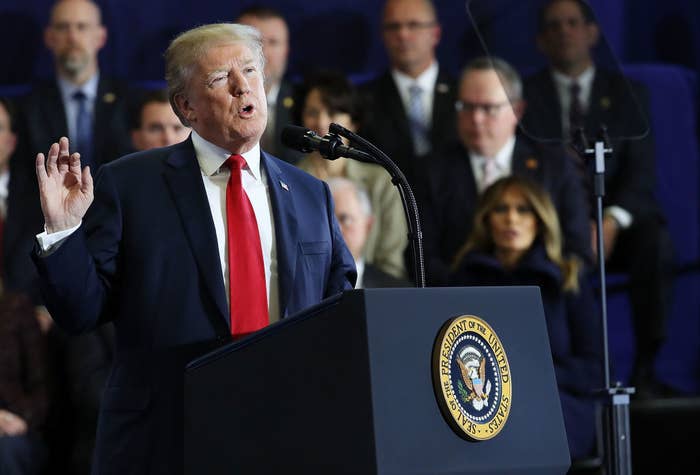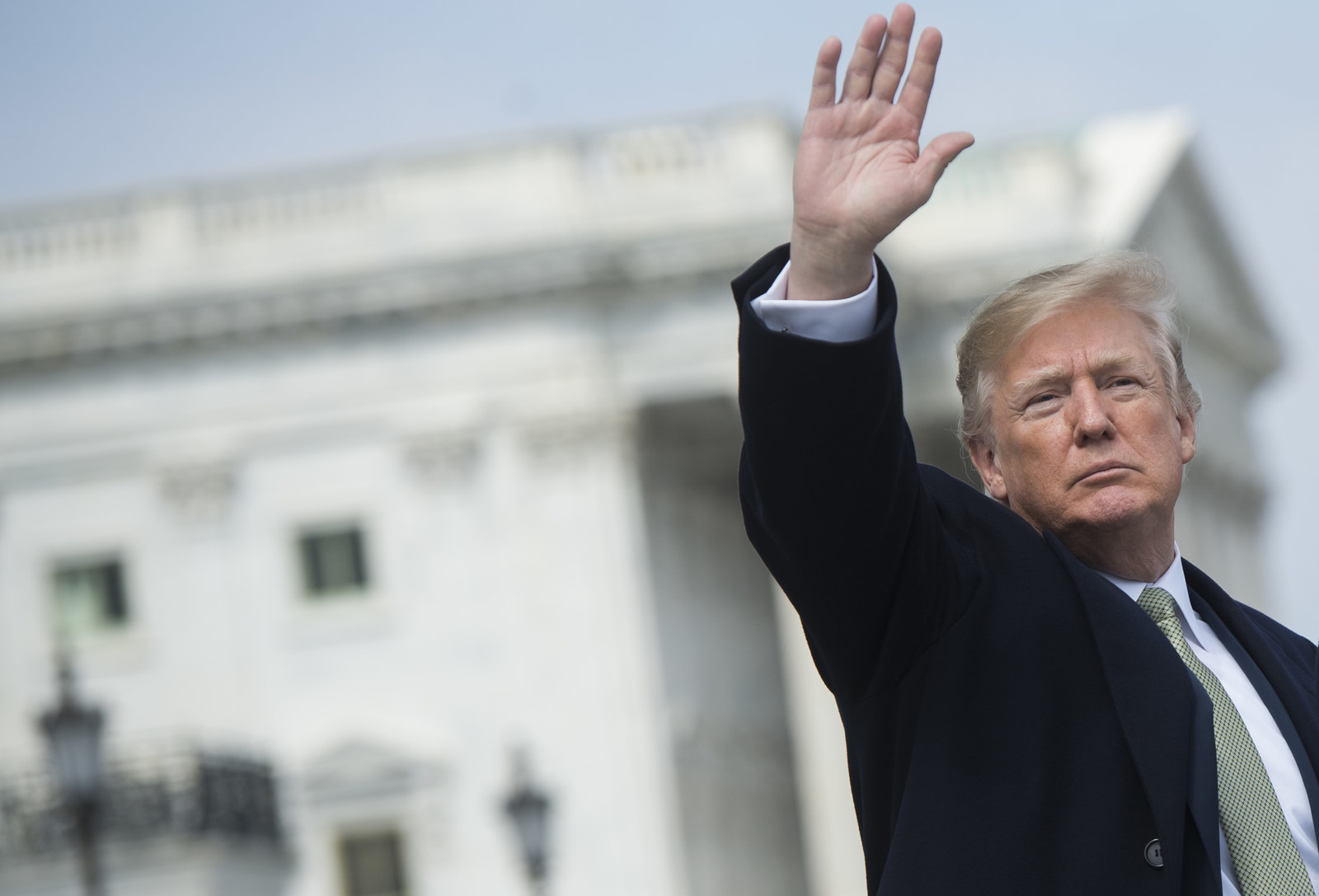
On 7 March, senior negotiators from the G7 group of the world's leading industrial nations were due to meet in Canada for a preparatory meeting ahead of the annual summit in June. So concerned were the German, French, Italian, and British officials about the prospect of President Trump slapping tariffs on steel and aluminium imports that they had taken the highly unusual step of meeting in advance to agree a common position, a European diplomat who was present at the meeting told BuzzFeed News.
But the Europeans' strategising turned out to be all for nothing. No sooner had the senior US negotiator landed in British Columbia than he learned his boss, Gary Cohn, had quit his job as Trump’s chief economic adviser because the president was about to announce he was going ahead with the tariffs. The official turned around and flew back to Washington, DC.
The next day, Trump signed two proclamations to apply additional tariffs of 10% and 25% respectively on certain imports of aluminium and steel into the US.
“The meeting was basically useless,” the European diplomat said. “We were all waiting to hear from the US, and along came Trump’s proclamation. A significant, unequivocal signal.”
The episode – the latest twist in a fraught set of tense and often bizarre EU-US encounters – reveals just how worried the Europeans are about Trump's apparent willingness to start a trade war, and the challenge of resolving this while dealing with a US administration in chaos and a president they see as erratic.
This latest standoff tees up a crucial week for transatlantic trade as the EU tries to maintain a strong, united front that pushes back against Trump but doesn't provoke further escalation – a task made even harder by recent election results, especially in Italy, that demonstrate the rise of populism in Europe too.
The tariffs, which are due to take effect from Friday, are likely to feature in Thursday's European Council meeting of EU leaders in Brussels, and European officials are due in Washington for talks this week.
The White House argues that the tariff measures address threats to national security caused by the imports of aluminium and steel from certain countries.
The European Union describes the move as unjustified, and has rubbished the national security argument, believing it is simply a disguise to introduce new tariffs.
While the EU has publicly said it is ready to retaliate if Trump includes European imports in the tariffs, government officials on this side of the Atlantic have told BuzzFeed News that they fear the president will try to divide and conquer by offering deals to individual EU nations in an attempt to isolate his real target: Germany.
“He talks about Europe, but Germany is the target,” the diplomat said.
Any move by Trump to carve out exemptions or specifically target any individual EU states would be technically illegal – and unthinkable under any previous US president – because trade is a competence of the EU as a whole. The worry, however, is that Trump, in his disregard for international norms, could try to drive a wedge between the EU’s 28 member states by offering bilateral arrangements and sweeteners.
“I am very worried about this possibility. It’s a big risk. It would be really important to remain united because it would be very, very serious. In effect, Trump would not be recognising the EU,” the diplomat said.
“There is solidarity between member states. France would stick by Germany. The UK is on side too for now. But who knows if it comes to it? Officials are all in agreement, but they respond to governments of course, and you have the business lobby, public opinion, populists…” the diplomat said.
They specifically mentioned Matteo Salvini – the far-right, anti-EU, pro-Trump politician who was among the big winners of Italy’s 4 March election and could become the country’s next prime minister.
EU, UN, Merkel, Soros, Zuckerberg, Starbucks, journalists, judges, snobby celebs, Islam. All against #Trump. How can you not LOVE him? https://t.co/fkqzAHX7PM
European governments have long been puzzled by Trump’s inconsistent and often unconventional approach to major global issues. The latest personnel moves in the White House, which have seen foreign secretary Rex Tillerson fired – apparently via a tweet – and Cohn quit, have added to the uncertainty and instability of EU-US relations, another senior official from a European government told BuzzFeed News.
“The changes in the White House don‘t bode well for multilateralism and reasonable ways out of the trade crisis. The president won‘t in the future have to listen to views different from his – and that‘s how he likes it,” the official said.
At the G7 meeting in Victoria, BC, earlier this month, the emissaries from the four European governments agreed there was a need to find a balance between a firm reaction on the one hand, but caution, to avoid the situation escalating out of control, on the other.
“The key word isn’t ‘retaliation’ but ‘rebalancing’ with measures proportionate to any damage caused by tariffs introduced by the US,” the diplomat said.
“Germany, in particular, is very worried, and wants to keep the tone down, including the language of the [European] Commission, use the G7 for a direct dialogue with the US, and not as a place for retaliation.”
The diplomat described the UK’s like-mindedness with other European officials on how to deal with Trump’s aggressive trade stance as “total”. “We were very happy about this,” the official said.
They continued: “The European Commission will fight to exempt the EU from Trump’s tariffs, and any response would be through the WTO [World Trade Organization] to make the point that differences need to be resolved in a multilateral context.”
Trade, which formally wasn’t even meant to be on the agenda at the Canada meeting, was “the elephant in the room”, the official said.
.@realDonaldTrump "will fail" if he tries to split European Union member countries with trade sticks and carrots, warns German Econ Min @peteraltmaier ahead of a visit to Washington #TradeWars https://t.co/TICcaD9t52 @afp https://t.co/CNc08qrwUi
On Friday, Brussels published two lists with US products that it would target if the increased tariffs were imposed. The total value of US exports targeted could reach €6.4 billion, and includes products worth €2.8 billion that can be targeted immediately with new tariffs after notifying the WTO.
Both German officials and the EU’s trade commissioner will be travelling to the US this week for separate meetings with US officials. The EU’s 28 leaders are also expected to talk about trade issues over dinner at a European Council on Thursday.
Last week, the European Commission sent a restricted note to member states that confirms that the EU will hit the US with tariffs and other safeguards and bring a possible case to the WTO if Trump doesn’t back down.
The document, which BuzzFeed News has seen, details the EU’s arguments demanding a full exemption from Trump’s measures, and sets out how the 28 member states would respond if the president persists with slapping new tariffs on Europe's steel and aluminium.
In a meeting in Brussels two days after the proclamation, US trade representative Robert Lighthizer told the EU’s trade commissioner Cecilia Malmström that any final decision would be for President Trump, and that the president would have “a broad view of the national security concept”, the document reads.
The EU is seeking a total exemption from the measures, and is basing its case on a four-pronged argument:
EU exports are not the cause of the difficulties facing the US industry. “Simply put, the EU is not and will never be a low-cost producer [of steel] flattening prices in the US market,” the document states. The EU also supplies a very low share of US primary aluminium imports.
The EU is not contributing to global overcapacities of steel and aluminium. Indeed, in these sectors the EU itself is also suffering from its effects, and lists examples of where it works with the US in international forums to curb unfair trading practices.
The EU does not constitute any security threat at all to the US. The document notes that the EU is a key US ally in the fight against ISIS, within NATO, and in numerous key challenges around the world, including in dealings with North Korea, Russia, and Venezuela, as well as partnering in operations in Afghanistan, Iraq, the Sahel, and in Central and Latin America, contributing directly to US security.
If diplomacy fails, the EU is prepared to introduce its own safeguard measures to protect its market as a result of the potential disruptive and damaging impact of US tariff measures.

Previously, there was a sense among European officials that this year’s G7 hosts, Canada, were hoping to keep controversial issues off the leaders’ table when they meet in Charlevoix, Quebec, in June. But that aspiration has been torpedoed by Trump’s latest trade manoeuvres.
And differences on other issues, such as climate change, also continue to grow. What remained of the US delegation in Victoria presented proposals for “Building the Energy System of Tomorrow.”
The document, which the official described as a set of "extremely vague principles that look to the past more than the future", made no mention of climate change, renewable energy sources, decarbonisation, or the goals of the Paris Agreement and ignores the link between climate change and energy.
“We made clear that we cannot accept this,” the diplomat said.
“Canada acknowledged that the issues are impossible to avoid in Charlevoix,” the diplomat added, noting that the distance between the US and everyone else is so great that it could prove too difficult to adopt a final communique.
